By Leigh-Ellen Romm
Success is as varied and nuanced as the people who define it. Being the best, the first, the richest come to mind. Clearing hurdles, influencing opinion, or solving problems also ring true. Is it an outcome or is it a process? Success is complicated.
“The narrow definition of college success, I suppose, is that students are retained and they graduate on time,” said Dr. Karla McCain, Associate Vice President of Academic Affairs and Professor of Chemistry. “I think at Austin College, we believe that student success is more than that. We mean that students have the kind of quality, deep-learning experiences that are the hallmark of an Austin College education. We want our students to do more than just meet requirements. We want them to have a life-changing experience, and that’s all part of what student success is here.”
Austin College wants its students to not only complete college but also be transformed by the learning experience.
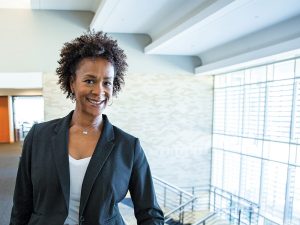
Director of Student Success and Transitions
To help fulfill that intention, Austin College has welcomed Traci Howard Moore as Director of Student Success and Transitions within its Academic Affairs Division. Moore’s professional experience in higher education includes work in admissions, career counseling, and development of persistence in underrepresented students. She has a bachelor’s degree in Social Work from University of Nebraska at Omaha and a master’s degree in Educational Leadership from San Diego State University.
She arrived on campus in August 2020 to develop the new program. At the same time, she has helped prepare students for on-campus learning with COVID precautions in place and synchronous remote learning for students who elected that option.
Vice President of Academic Affairs Dr. Beth Gill said, “The Student Success Initiative is designed to be a data-driven, proactive, holistic, and comprehensive student-centric strategy that will impact how we recruit, enroll, orient, advise, and support students at Austin College.”
Gill said that at the core of the program is an overall, data-driven strategy for early identification of students’ needs based on an analysis of what is known about their academic performance, and social and experiential engagement.
Chartered nearly 175 years ago, Austin College has always expected success for its students. How is it different in 2021? “The students have changed,” Moore said. “Student bodies have become more diverse, especially at Austin College with more representation of first-generation college students and students of color.”
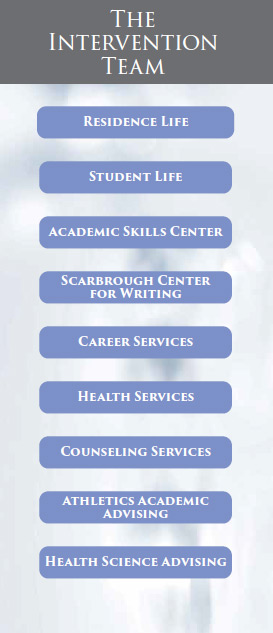 Demographics from 2019 show a minority majority of 54.2% for first-year, first-time Austin College students and 52.6% minority for the student body overall. McCain agreed with Moore and points out that Austin College has many more students now who come from family backgrounds that don’t include any college or, if the parents or siblings have attended college, not at private, liberal arts schools.
Demographics from 2019 show a minority majority of 54.2% for first-year, first-time Austin College students and 52.6% minority for the student body overall. McCain agreed with Moore and points out that Austin College has many more students now who come from family backgrounds that don’t include any college or, if the parents or siblings have attended college, not at private, liberal arts schools.
Moore said, “Colleges have realized that they need to provide support to help students fill in areas where they may be deficient or need a little bit of help—not only with content but with study skills and social connections.”
She continued, “I think student success now is not just defined by what the student does—but has positioned schools to look at what we do to make sure we are providing and helping the students find success in their terms—understanding that we have to meet the students where they are.”
At Austin College, success is for all—not just those who know a secret or have a key. Here, it is possible for everyone to be featured in their own success story.
“Once students who would benefit from targeted proactive support are identified, Traci coordinates the support strategy and provides the leadership necessary to broaden and deepen academic support services and student life connections between departments,” Gill said. “She creates the infrastructure and support for students to identify and achieve their academic goals. Much like a case manager in a clinical setting, Traci takes a comprehensive and holistic view of each student’s particular needs and coordinates the support they need to resolve academically related student challenges.”
Moore’s role enables her to transcend divisional boundaries, so the team works proactively before the student loses confidence and is unable to recover. This collaboration includes an early alert referral program designed to expedite support.
“As we’re building this program, it’s pretty broad in terms of the areas of focus,” Moore said. “The intervention team and faculty can submit an alert about a student who is struggling in class. That alert comes to me and we look at these students and develop a plan to help them. I coordinate that process.”
“It’s not usually just that the student needs tutoring, it also may be that the student is dealing with a family issue, mental health, or may not feel connected,” Moore continued. “All these things could be happening and may be impacting their academic performance.” The intervention team includes Residence Life, Student Life, Academic Skills Center, Scarbrough Center for Writing, Career Services, Health Services, Counseling Services, Athletics Academic Advising, and Health Science Advising.
Moore said, “I always try to preface my introduction and outreach to them with my name, title, and what I do, and here’s why I’m contacting you. I think students are relieved in some way. I tell students that, we wouldn’t be here right now, having this conversation if your faculty member didn’t care about you. Someone is concerned and trying to make your journey happen.”
Even under pressure and during times of difficulty, students can learn, grow, and transform with guidance from the intervention team.
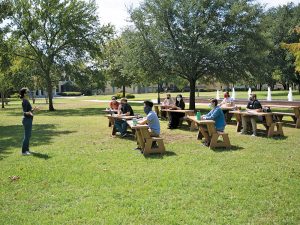
Meanwhile, McCain regularly conducts research with students and faculty about their experiences at Austin College to understand the students’ needs and assess their risk levels for success.
“My model is built on academic variables and one financial variable—like GPA and credit hours, and account balance. Those help identify the students who have quantifiable challenges. The other important work we’ve done is qualitative,” she said. “In spring 2020, I did a lot of interviewing of faculty mentors who had Communication/ Inquiry classes and who had students who did not come back for a second year. I asked them, ‘Why do you think that student didn’t come back?’” she said. “Getting to some of the why is very informative and important in our thinking about this initiative.”
“It turns out, I routinely heard that some students were doing well academically and were really engaged in their courses—yet they left the College. A lot of them fell into this category of students who were not athletes, weren’t Greek, weren’t science majors. They never seemed to really find their social niche or their people,” McCain said.
McCain says that research conducted since COVID shows that students are concerned about their futures. “Far and away, the thing that holds the most interest right now is what they’re going to do when they graduate,” she said. “Even in the midst of everything going on, they are telling me they are struggling with time management and organization—but that’s not actually what they want to learn about. They want to learn about career exploration.”

This research is informing communication and programming to build a strong foundation for all Austin College students. McCain listed several ideas for the future, such as adding a social aspect to the Honors program, teaching financial literacy, providing broader programming about mental well-being, and developing work-study jobs that help students learn to use professional competencies while working on campus.
All students and their families have access to the new Student Success webpage. The page introduces and links to many offices dedicated to supporting students. Students can make appointments for assistance in many areas from physical and mental health, academic and writing tutoring, and more. There are also downloadable resources for time management and study skills, and student-produced videos with firsthand tips from peer tutors.
 “We are improving tools and proactively communicating with students to create an efficient referral process and coordinated case management system,” Gill said. “Ultimately, our efforts will improve student retention, persistence, and graduation rates.”
“We are improving tools and proactively communicating with students to create an efficient referral process and coordinated case management system,” Gill said. “Ultimately, our efforts will improve student retention, persistence, and graduation rates.”
With the work of the Student Success and Transitions office, students at Austin College can emerge strong, multifaceted, and transformed—like diamonds.
At Austin College, success is for all—not just those who know a secret or have a key.
Here, it is possible for everyone to be featured in their own success story.


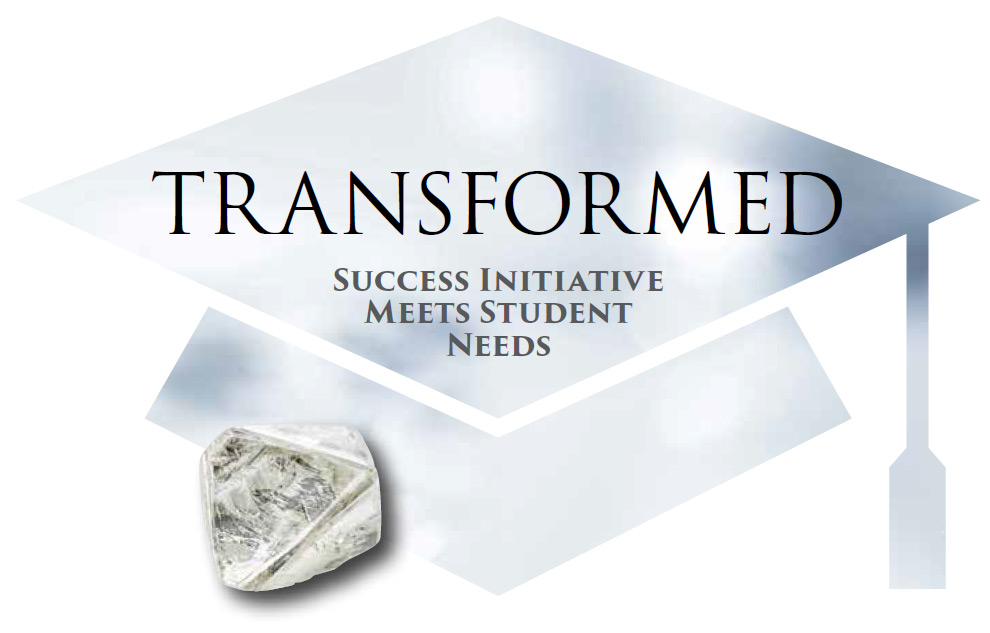

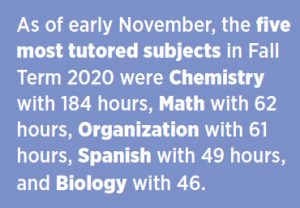 ASC staff members reported work with 460 students in Fall Term 2020, which is 36% of the student body. In non-COVID years, the percentage of students hovers closer to half of the student body. This fall, 160 of the students supported by the ASC are registered for ADA services and accommodations. “It’s a very inviting place,” said Miles. “If you come often enough, staff members Laura Ramsey and Kate Boessen will get to know you.” The ASC has regularly scheduled review sessions, peer tutoring by appointment in person or online, and the opportunity to have a standing appointment for academic coaching.
ASC staff members reported work with 460 students in Fall Term 2020, which is 36% of the student body. In non-COVID years, the percentage of students hovers closer to half of the student body. This fall, 160 of the students supported by the ASC are registered for ADA services and accommodations. “It’s a very inviting place,” said Miles. “If you come often enough, staff members Laura Ramsey and Kate Boessen will get to know you.” The ASC has regularly scheduled review sessions, peer tutoring by appointment in person or online, and the opportunity to have a standing appointment for academic coaching.